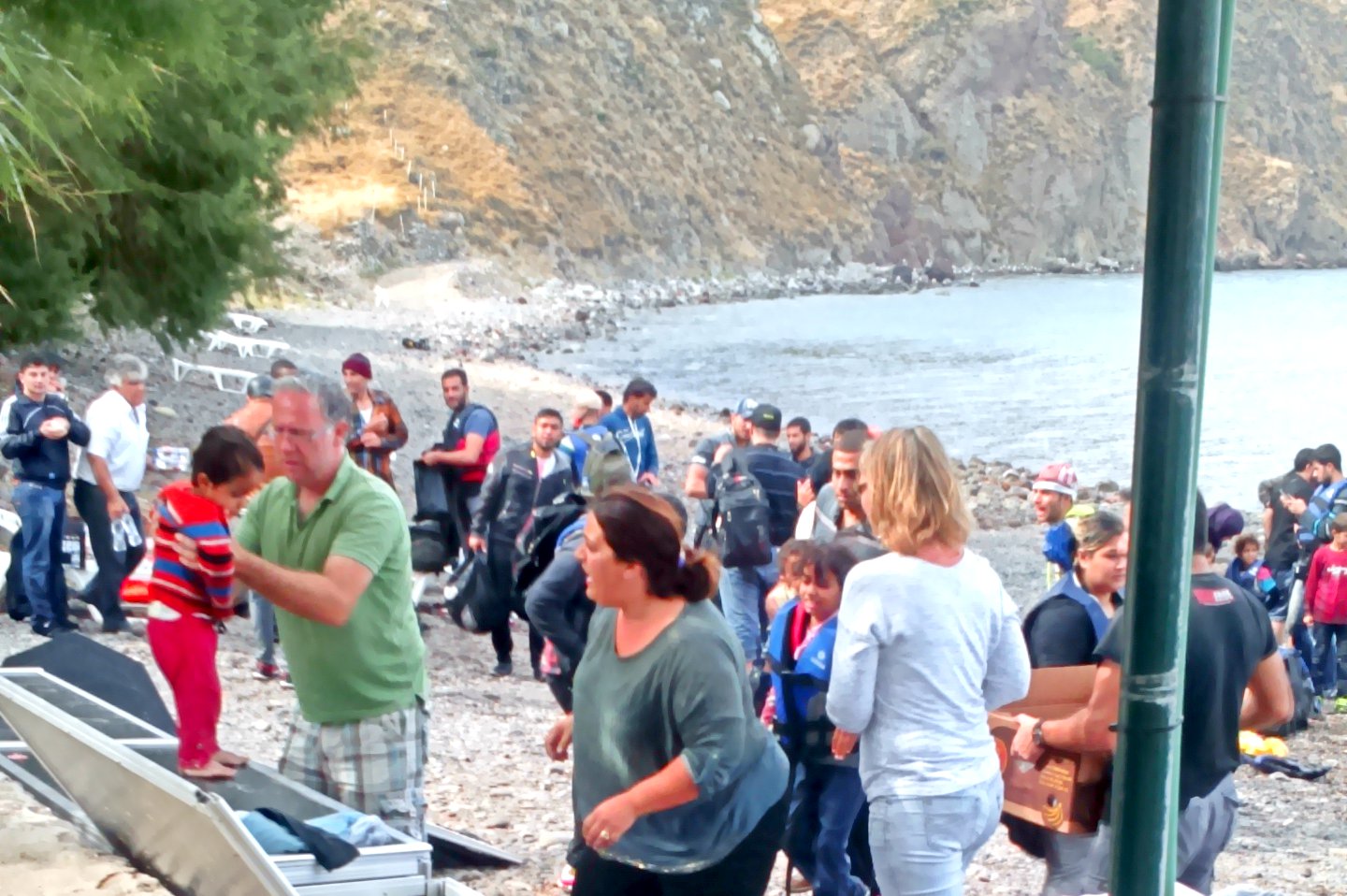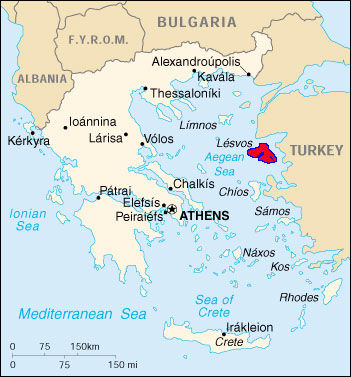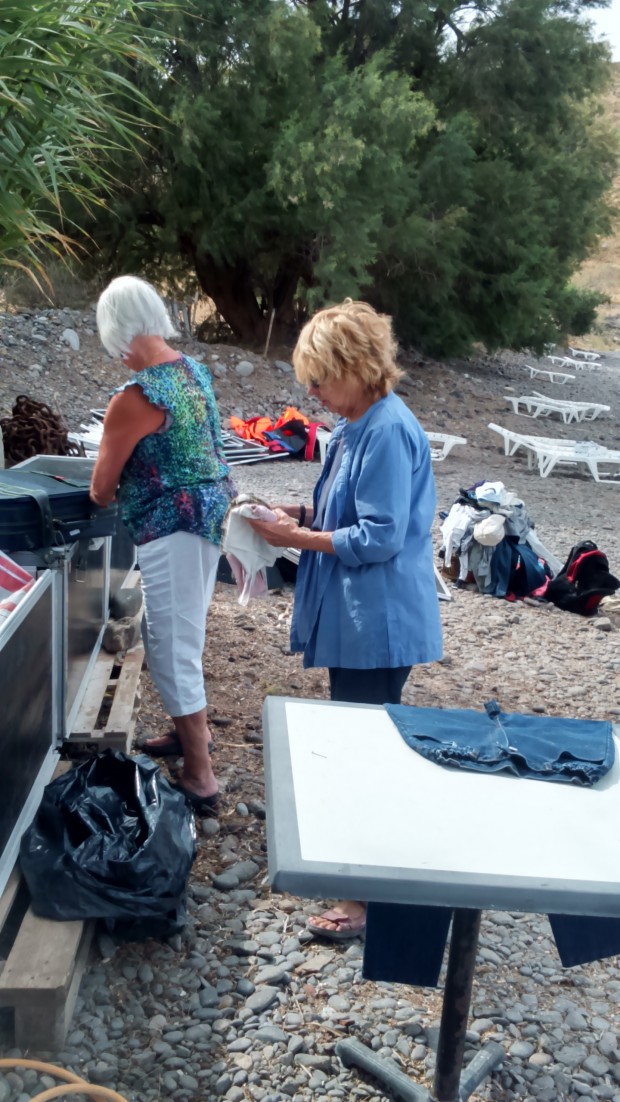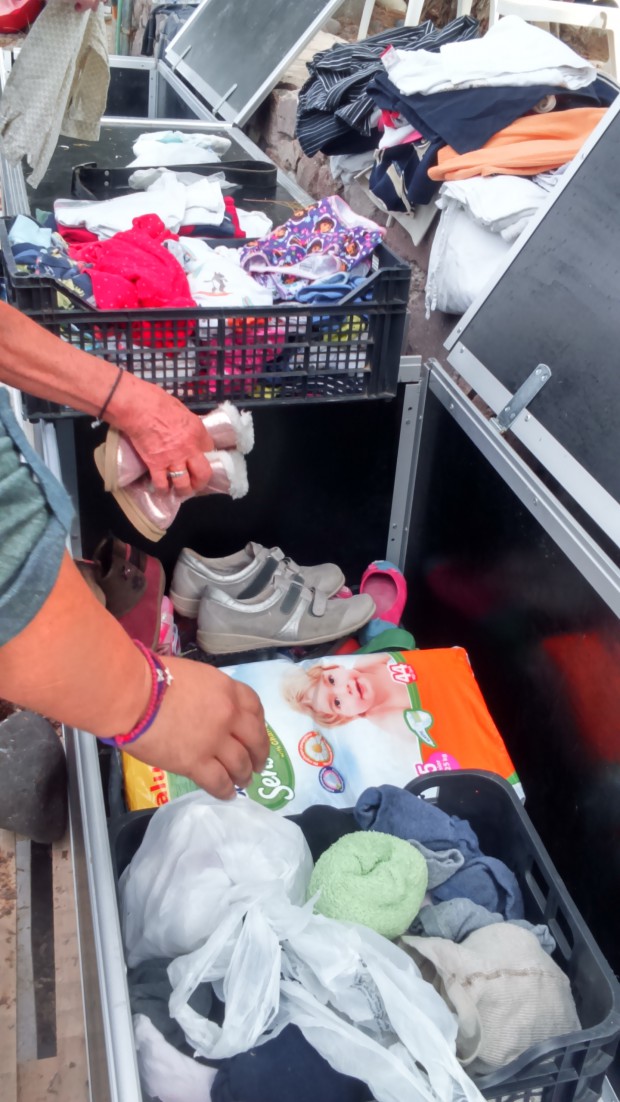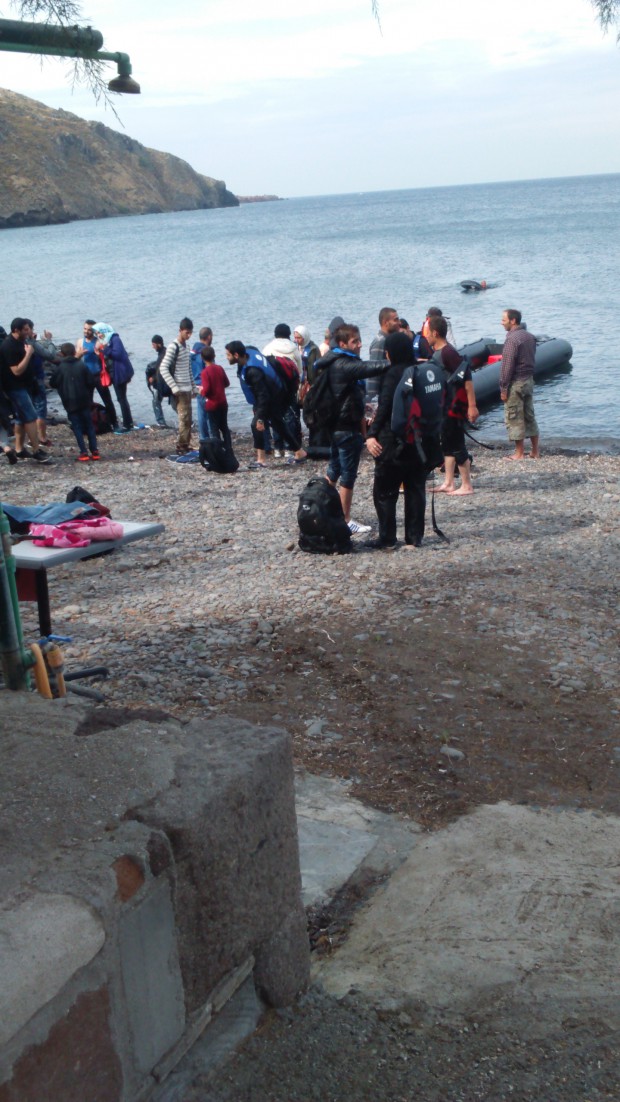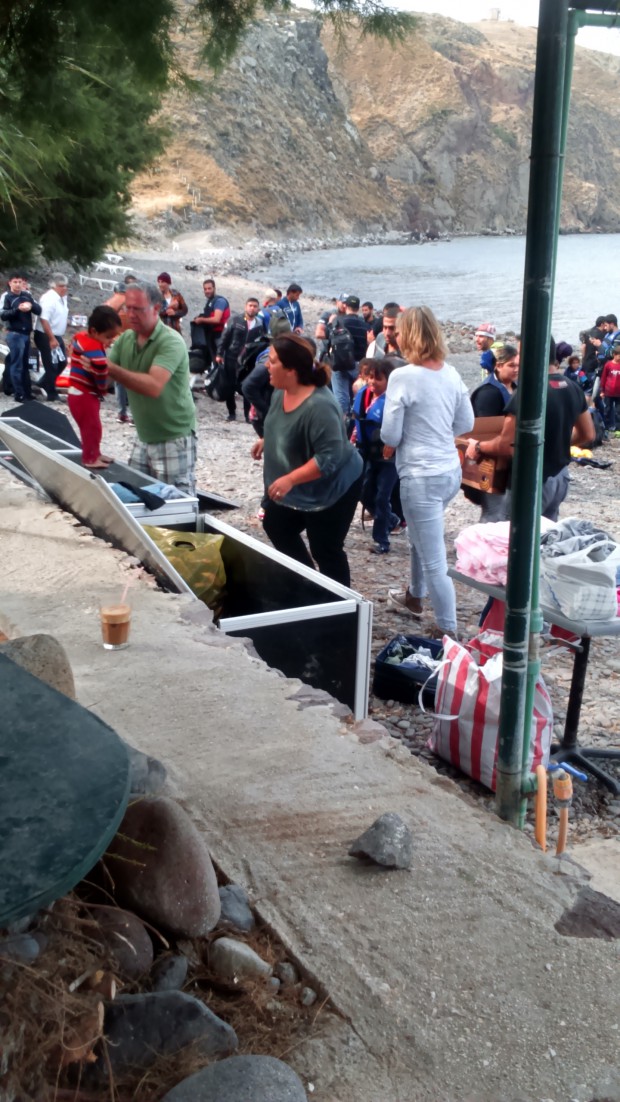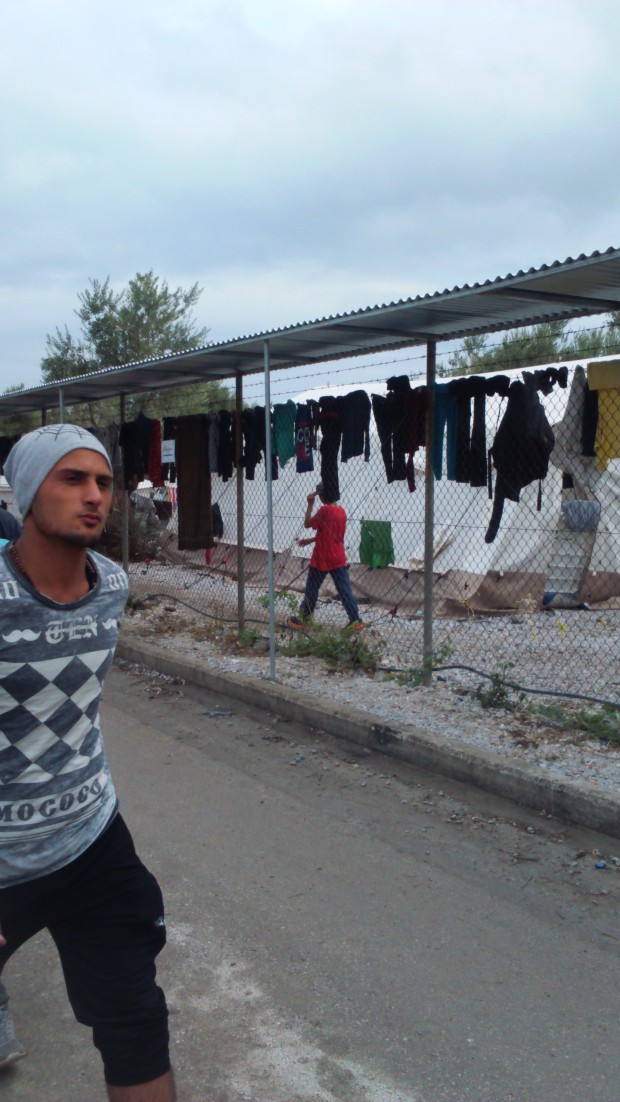Two days in Molyvos and one in Mytilene, were enough for me to get to know people and situations related with the refugees. With this article I want to share my experience.
It is now well known that the in last few weeks, the reception of the refugees, who have arrived by the hundrends of thousands during this year, has been organised. The reception is far from appropriate, but it has now been accepted by the Greek government that it has to facilitate them to register, to cross Greece and to arrive whereever they want and they dream.
Thus, their transport from the beaches where they arrive takes place with the use of buses and their registration in the two camps of the island, Moria and Kara Tepe that lie outside of the city of Mytilene. Subsequently they take the special boat Eleftherios Venizelos, of 2.500 capacity, after they pay a ticket, or they take the line boats which are no longer full of tourists, as they were previously.
The policy of the European Union does not confront the problem of the huge flows, primarily because they don’t want to do so. The Greek government tries to impose the self evident policy of sharing of the refugees in the countries where they want to go, but, as we see every day, the obstacles and the rejections are to be found in everyone of their steps.
The rest, that is who is to blame and which wars and what poverty lead the people to mass depatriation, we shall analyse another time, although they are almost self evident. The fact is that we live in a climate in which the consequences of wars are moved inside Europe, which changes in a great extend the lives of European citizens, this is why there is an urgent need for understanding the phenomenon and for its democatic and humanitarian political address by the society as a whole.
Meeting Afroditi Vati
I met Afroditi Vati in the wonderful hotel of her father, which carries her name, in Molyvos of Lesvos, midday of the 22nd September. I was taken there by my Australian friend Julie Copeland, who spends 4 months every year with her partner John in Molyvos, which they love from their youth. This year, from the first moment they set foot in Molyvos, they participated to solidarity on a daily basis. I had asked her to meet her friends involved in solidarity, and she took me to the hotel.
There were also the husband of Afroditi and their two small kids, we made the introductions and she ordered coffee for us. This coffee never come, because some persons started shouting from the beach of the hotel: “a boat is arriving”.
Immediately everyone run, her father Dimitris Vatis, her husband and persons from the hotel personnel.
Dimitris went quickly in the beach, despite his problematic knee and made signs with his arms leading the boat to the spot it should land.
More than 50 people begun to disembark, men in their majority, but also women and children, with the water in the boat knee high, their clothes dripping and the jaws of some hitting. The travel was very good, had lasted for one hour. They had not faced any danger. The weather perfect. About 10 persons had in the meantime arrived at the beach for solidarity, among who customers of the hotel, who already knew what to do.
Some of the refugees fell in their knees to kiss the ground of the beach in which they had arrived safely. The solidarity women opened some of the big boxes in which they were keeping dry clothes, and started giving to everyone. First the children. The 5 year old boy made faces and kicked the collan his mother was putting on him, because it was too coloured. Finally, he accepted it. The middleaged lady, covered from head to feet with a black robe, with open face fortunately, did not want to take off her wet clothe, because what she was given to change with was not black and long. Finally, she accepted to wear a pink gown, but in a few minutes we saw her to have put her black wet dress on top of this gown. Unfortunately, serious shortage of shoes, since they were all wet. And where to take their wet clothes that they had already squeezed from water? And where the shoes? And how they could dry them? If we had a dryer here, said Dimitris, it would help the situation.
Quite a few telephones were taken immediately for charging, in the shady construction of the beach, where there was an “octapus” with all kind of chargers.
The boat was quickly deflated, the engine was taken out and placed a little further to the back, in an open space, together with another 27 engines as I counted. The floors of the boat were also kept a bit further, perhaps in order to make more boxes with their recycling, like those where they had stored the dry clothes and they were constructed by the solidarity people.
The deflated boat is very big and very heavy. The small van loaded it, together with many life saving jackets, and took it for recycling. Where? In an appropriate place, they told me. Not like those you see thrown in the sides of the Molyvos roads. What do you do with the engines, I asked Dimitris. We have telephoned the authorities to come and take them, but they don’t. Some of them get stolen also, we can’t guard them in a closed place, he replied.
“In 10 minutes there will be a bus here, go on the road”, Dimitris started announcing to the refugees, in English. He had phoned after the boat came, and had arranged. “There is a strong positive development in the last few days concerning the transportation of the refugees. Until last week, most of them had to walk up to Molyvos, a few kilometres under the strong sun, to go to the school from which they
were taken away a few days before the school was to open, in face of the new school year and now they take them to Oxy, a place where there is simply a huge tent under which they concentrate. The buses and the taxis did not take them, despite they had money, because this was the order”. Thus, many solidarity people, had to make 4 routes every day to take mainly families, in their private cars and their own petrol, in order to offer this important solidarity. Many times, especially in July and August, they had to walk to the camps of Moria which opened in the meantime and of Kara Tepe, near Mytilene, about 50 kilometres. And when we say 50 kilometres there, the road is full of bends and the speed low even for the cars.
In one hour, after everything had finished, we ordered another coffee, in the tavern, in the beach. When we drank it, we saw the next boat coming. Everything from the beginning until the end for this lot of people in the boat.
These were a little more, more than 60, because the boat was bigger. They also traveled without problem, for 45 minutes. They had them in a deserted island, out of the coast of Turkey, waiting for 5 days, without water and food. They paid 1.500 euro each to the traffickers in order to set foot on the much longed for boat.
The interview with Afroditi (on 26-9-15)
– Since when did the boats start coming?
From the first day our hotel opened for the season, 28-4-15. Our hotel functions since 1989.
– How many boats have come for this period?
From the first day up to now, about 70 boats. In the neighbouring beach of Skala Sikamnia, there were also 2 wooden boats, about 150 people in each, 3 weeks ago.
– I saw you have a perfect organisation. Since when is this so?
When we realized we needed much better organisation, when boats were coming even in the middle of the night.
– Who gives all necessities when the boats come?
Since the beginning, the waters and some food we gave from the hotel. We gave towels of the hotel, those left from the renovation, we appealed to friends, but we didn’t ask exactly for assistance, we informed through the internet and some people responded, some shops with clothes, brand new, some of them were closing down and said these are for the refugees, I cannot sell, I close my shop. Quite a few shops did this. Even from America friends of mine have responded, as well as many customers, who were giving whatever they could when they were leaving. And they send us more when they returned to their homes.
– In which shores do the boats come?
Our shore is called Keramidario or Faros, and next to us is Limantziki, after Tsipouri and after that Eftalou. Skala Sikamnia is further. Most of these boats come to these shores.
– How many refugees arrived this summer?
This summer they must have arrived more than 100.000, there were days when 7.000 were arriving each day. Yesterday in the two costs, ours and Limantziki, 9 boats came, about 540 persons. 50-70 persons in each boat.
– Economically is not solidarity very expensive for you?
Until now, whatever we gave was from our own pocket, fuel, food, water, personnel to help the people, and after to clean the beach. Imagine 6 boats every day, 6 hours from the personnel’s working time. Add to this the cancellations, because there was a great number of bookings, which were canceled. During the summer months, when we had much publicity in the media, about 50% f bookings was canceled.
– Were you found in a situation where you had to assist shipwreckers?
No, we simply had to assist wounded and to take them to the Health Centre in Kalloni. Yesterday a woman was at least 8 months pregnant, we called an ambulance because we were afraid she would give birth. When we see a need for lifesaving we call the coast guard. Yesterday there was a problem with a boat, and the coast guard pulled them to the coast.
– You, Afroditi, how do you feel that you were found in this cyclon?
I feel upset, unprepared, we didn’t expect it. At this moment, the real colours of people in the society we live in, come into the open. There are very extreme edges. On one side, you have intense feelings of anger, for what happens to you, that there was not up to now any support from the state, and we were very glad to see mr. Mouzalas in the ministry for migrations, he took measures very quickly to confront the situation. On the other side you have the support of the people from everywhere, they send you many messages. It is sad every time you see them coming our of the boat, you don’t know who they are, but they are people like you and me. They have a mother, a father, they have studied. To enter such a boat and to put your children and to make such a journey, you must be desperate.
– Are you not afraid there may be traffickers among the refugees?
Of course we are afraid that among these people there may be some who have a certain agenda. We are afraid of this, but the state must control and Europe should be
here, because we are the borders of Europe, and they should be near us from the beginning, they should not leave us alone. Let it be done, even now. The only thing we can do, is to help these people who come.
– We also saw volunteers from Europe
Of course there are volunteers from some places of Europe, some get paid some not. What interests me is that the job is done, above all to have collaboration, among the locals, the solidarity people, the government and Europe. And from then on they should confront the war which is the cause for the flow of refugees.
The volunteers
I met Timothy Jay Smith who comes every year for many months, with his partner, because he is in love with Molyvos, as many foreigners, men and women who see Molyvos a place to live and don’t feel tourists. Some of them have bought houses. We spoke with him on the 23-9-2015.
This year, Timothy came in the beginning of May. He is a writer and his partner, Michael, is a photographer. His actions are spontaneous, despite he has experience with solidarity in other frameworks, especially in older times with the (controvertial in any case) USAID. In the US themselves, he has worked in areas with poor population. Since the first moment, he plunged into solidarity work, despite he is not in any organisation at the moment. In the beginning of May, there was nothing in the international press for what happenned in Molyvos, he said, and more generally about the refugee flow, but he, by himself, made many publications until the issue became a constant interest in the media, in a matter of a few days.
He made posts in the facebook himself, also in other electronic platforms and he safeguarded important offers from people abroad, he managed to offer a lot to the refugees during the first difficult months. He has offered large quantities of food, when this was needed, plumbing repairs in the installations of PIKPA (foundation for children), 3000 caps that are absolutely necessary for the sun, he has payed for 23 buses for the transportation of the refugees when no-one was transporting them, costing 300 each, medicine for children, he brought a mobile kitchen from Mytilene in order to help the refugees when they were taken away from the school and they were transported in the nearby OXY.
In May and Jine, he told us, there was no organisation. From Molyvos itself there were about 25-35 persons, mainly foreigners, who collaborated and Melinda who has a tavern in the little port, who did an excellent job. Until June, Melinda estimates that items worth 9000 euro a month were needed. Now, she estimates that they need 1000 euro per day.
Since July, quite a few organisations have come here, each of them doing its own piece of solidarity. The French organisation Chaine d’ Espoir (Chain of hope), the organisation Islamic Relief based in London offers interpreters, the International
Rescue Committee, the Boat Refugee Foundation from Holland, groups from Sweden, Norway and Denmark. I believe the International Rescue Committee will probably be at the head of all the other organisations, so that a necessary co-ordination will be achieved.
There are also Greek groups, based mainly in Mytilene.
In the area of transportation with buses as in many others, UNHCR contributed decisively.
Julie Copeland, in collaboration with the above, made her own efforts to collect money from Australia, she helped transport of the refugees in her own car and offer of foodstuff, fruit and waters for the first needs.
The camps of stay and passage
There are two camps near Mytilene, Kara Tepe for Syrian refugees and Moria for the rest. The presence of UNHCR as well af of the Doctors of the World and the Doctors without borders is visible, but we didn’t learn about other organisations, therefore we ask to be forgiven for omissions.
We also saw many international solidarity people, men and women nurses, doctors and others who decided to offer two weeks from their holidays for solidarity. These two camps have “emptied” in the last week, since the wave of refugees is channeled more quickly towards Mytilene and the boats. They had more than 3.000 persons each during the previous weeks. When we say they have “emptied”, it means that there are more than 300 persons in each of them, moving populations, for their registration only, and for the purchase of a ticket for the boat, they stay in tents in the open, despite the strong rains of the last few days which worsened their situation. Toilets inadequate, water for washing little or inadequate due to the large number, quite a few light and wonderful slacks of UNHCR but how many can they house? This is one of the causes of conflicts often happening among the refugees, there have been also bloody incidents, but the police has no strength to intervene and to resolve such conflicts. Food was given when there were the previous massive populations in the camps, but in the last week no food is given, and those who have will eat, those who do not have, will not. Simply so. There is also medical care, but people have to wait for hours in the queue in order to receive it, clothes and shoes are offered whenever and however they exist.
In Mytilene
Until one week ago, thousands of people were camping in parks, in pavements, in the spaces of the port, anywhere there was a little space to put up a tent or a hard paper box. On the Thursday of 24 September, when we visited the city with friends, many areas were empty, others had scarce tents, while garbage and bags were everywhere, giving the picture of a real humanitarian crisis experienced by the refugees, the solidarity people, and the local societies, part of which is fighting heroically to save what can be saved from the dignity of the refugees and the normal life of the city.
On the line boat to Piraeus, the Blue Star, about 1.400 refugees managed to arrive in the morning of 25th of September in Piraeus, with uncertain future but decided to proceed to the unknown and to confront all difficulties.
The nation of solidarity
The crisis is massive, admittedly, but Europe must quickly undertake its responsibility and confront the side effects of its own world policy, as well as of the other countries of the “civilised world”, which seed winds every few years.
And if solidarity is not to be found in government, it certainly proceeds fast among the European women and men, even people from much farther places of the planet, like New Zealand, Canada, USA. A new nation is being consolidated these days: the nation of solidarity.
The clothes dryer
We, also, will offer our little something: in the coast of Keramidario, under the hotel Afroditi, we promised to buy the clothes dryer in order for the locals solidarists to dry the clothes and the shoes of the refugees, because the future of solidarity lasts long. We already have a part of the 500 euro needed, we demand urgently the contribution of our readers. You can write for the contributions in our mail, info@tomov.gr, and we will arrange the way we will take the money. Unfortunately, we cannot open a bank account for our organisation, because of the capital controls in Greece since the end of last June. This is how far the blackmail of the European Central Bank has arrived.
Sissy Vovou
Member of the feminist group TO MOV
27-9-2015





